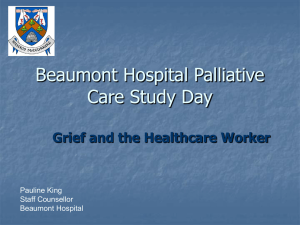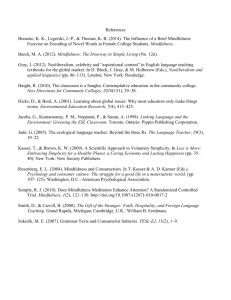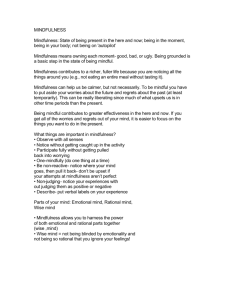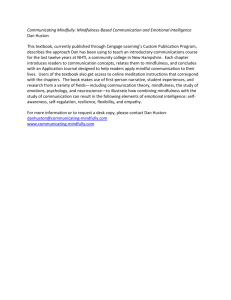RESEARCH BRIEFS STAYING IN THE MOMENT: DOES LEADER MINDFULNESS RELATE TO WELL-BEING?
advertisement
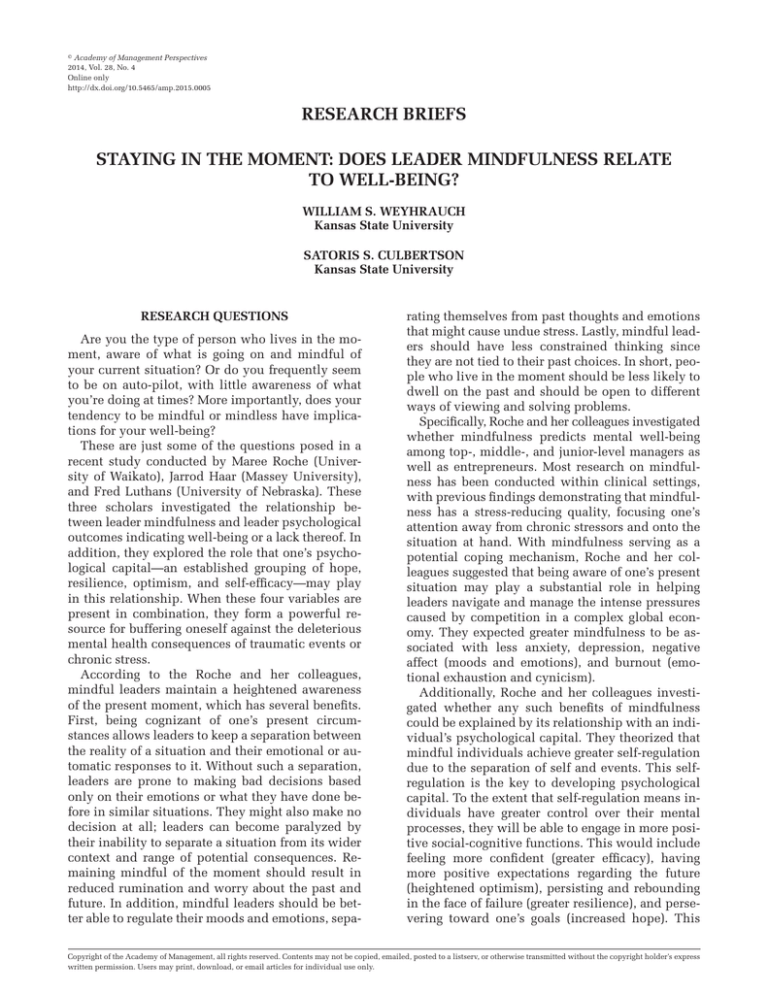
r Academy of Management Perspectives 2014, Vol. 28, No. 4 Online only http://dx.doi.org/10.5465/amp.2015.0005 RESEARCH BRIEFS STAYING IN THE MOMENT: DOES LEADER MINDFULNESS RELATE TO WELL-BEING? WILLIAM S. WEYHRAUCH Kansas State University SATORIS S. CULBERTSON Kansas State University RESEARCH QUESTIONS Are you the type of person who lives in the moment, aware of what is going on and mindful of your current situation? Or do you frequently seem to be on auto-pilot, with little awareness of what you’re doing at times? More importantly, does your tendency to be mindful or mindless have implications for your well-being? These are just some of the questions posed in a recent study conducted by Maree Roche (University of Waikato), Jarrod Haar (Massey University), and Fred Luthans (University of Nebraska). These three scholars investigated the relationship between leader mindfulness and leader psychological outcomes indicating well-being or a lack thereof. In addition, they explored the role that one’s psychological capital—an established grouping of hope, resilience, optimism, and self-efficacy—may play in this relationship. When these four variables are present in combination, they form a powerful resource for buffering oneself against the deleterious mental health consequences of traumatic events or chronic stress. According to the Roche and her colleagues, mindful leaders maintain a heightened awareness of the present moment, which has several benefits. First, being cognizant of one’s present circumstances allows leaders to keep a separation between the reality of a situation and their emotional or automatic responses to it. Without such a separation, leaders are prone to making bad decisions based only on their emotions or what they have done before in similar situations. They might also make no decision at all; leaders can become paralyzed by their inability to separate a situation from its wider context and range of potential consequences. Remaining mindful of the moment should result in reduced rumination and worry about the past and future. In addition, mindful leaders should be better able to regulate their moods and emotions, sepa- rating themselves from past thoughts and emotions that might cause undue stress. Lastly, mindful leaders should have less constrained thinking since they are not tied to their past choices. In short, people who live in the moment should be less likely to dwell on the past and should be open to different ways of viewing and solving problems. Specifically, Roche and her colleagues investigated whether mindfulness predicts mental well-being among top-, middle-, and junior-level managers as well as entrepreneurs. Most research on mindfulness has been conducted within clinical settings, with previous findings demonstrating that mindfulness has a stress-reducing quality, focusing one’s attention away from chronic stressors and onto the situation at hand. With mindfulness serving as a potential coping mechanism, Roche and her colleagues suggested that being aware of one’s present situation may play a substantial role in helping leaders navigate and manage the intense pressures caused by competition in a complex global economy. They expected greater mindfulness to be associated with less anxiety, depression, negative affect (moods and emotions), and burnout (emotional exhaustion and cynicism). Additionally, Roche and her colleagues investigated whether any such benefits of mindfulness could be explained by its relationship with an individual’s psychological capital. They theorized that mindful individuals achieve greater self-regulation due to the separation of self and events. This selfregulation is the key to developing psychological capital. To the extent that self-regulation means individuals have greater control over their mental processes, they will be able to engage in more positive social-cognitive functions. This would include feeling more confident (greater efficacy), having more positive expectations regarding the future (heightened optimism), persisting and rebounding in the face of failure (greater resilience), and persevering toward one’s goals (increased hope). This Copyright of the Academy of Management, all rights reserved. Contents may not be copied, emailed, posted to a listserv, or otherwise transmitted without the copyright holder’s express written permission. Users may print, download, or email articles for individual use only. Academy of Management Perspectives heightened psychological capital may help mindful individuals reap the rewards of lower anxiety, depression, negative moods and emotions, and burnout. STUDY DESIGN AND METHOD Roche and her colleagues examined survey data from four samples of managers across a range of industries in New Zealand. Each sample reflected a different sub-group of organizational leaders—toplevel leaders, middle managers, junior managers, and entrepreneurs. The samples were predominantly from the private sector and relatively diverse in terms of their age, job tenure, and levels of education. The study participants completed two surveys separated by two to four weeks. In the first survey, participants responded to items measuring their level of mindfulness and assessing their psychological capital. In the second survey, participants completed measures of anxiety, depression, negative affect, and burnout (indicated by measures of emotional exhaustion and cynicism). Anxiety and depression were measured in only the three manager samples. Negative affect was measured in only the junior and middle manager samples. Burnout was measured in only the sample of entrepreneurs. It is important to highlight that the current study consisted entirely of self-report survey data. As such, there must be some caveats. The exclusive use of self-report data is associated with problematic effects such as inflated relationships between variables. Although Roche and her colleagues took steps to counteract these problems (e.g., by spreading the surveys across time), it is still possible that the relationships they reported are not as strong as they suggest. In addition, although data were collected at two time periods, the findings cannot be used to argue for a causal link between mindfulness and leader well-being. Rather, the evidence from this study (to be presented next) can merely demonstrate that the two are related. It will be up to future research using longitudinal designs to truly demonstrate whether mindfulness actually influences psychological capital and leader well-being. KEY FINDINGS The central finding of the research was a consistent, negative relationship between leader mindfulness and problematic well-being outcomes, including anxiety, depression, negative affect, and burnout. For each sample, the statistical relationships between mindfulness and the various outcome variables were all significant and November demonstrated that greater mindfulness is associated with significantly better well-being outcomes. In addition, Roche and her colleagues found evidence supporting their expectation that mindfulness is related to greater well-being in part because of its relationship with psychological capital. In other words, the relationship between mindfulness and lower anxiety, depression, negative affect, and burnout is partly because mindful individuals have greater hope, resilience, optimism, and self-efficacy. But this heightened psychological capital doesn’t fully explain the relationship that mindfulness has with well-being. That is, mindfulness was also directly related to well-being. Put simply, being present in the moment and aware of one’s current situation is related to greater well-being for reasons other than increased psychological capital. Another finding of interest was that mindfulness and psychological capital tended to be higher among leaders at higher levels of an organization. In particular, top-level leaders reported greater mindfulness and psychological capital as compared to middle- and junior-level managers and entrepreneurs. CONCLUSIONS AND IMPLICATIONS This research offers new evidence on the beneficial effects of mindfulness. The study is the first to establish the role of mindfulness and well-being among organizational leaders, and demonstrates how organizational phenomena generalize across organizational levels. The evidence that mindfulness operates at least partially through psychological capital in relation to well-being suggests that mindfulness may have both a protective, buffering influence on a leader in the face of stress, but also a proactively enhancing benefit, increasing leaders’ hope, optimism, resilience, and self-efficacy. Organizational leaders should take note of this, whether or not they currently feel hindered by the stress and pressure of their positions. They should also note that psychological capital is a finite resource. When confronted by stressors, leaders will use up their psychological capital over time, just like money or other tangible resources. It must be replenished, therefore, before additional stressors can be addressed. Thus, anything that may help leaders maximize their capacity for this resource should be sought out by all leaders. The finding that levels of mindfulness and psychological capital are higher among top-level leaders suggests some interesting implications, in need of further investigation. It may be that mindfulness and psychological capital give leaders a better 2014 Weyhrauch and Culbertson chance to rise up through an organization and achieve high levels of leadership. Or it may be that once there, top-level leaders have learned to develop the mindfulness and psychological capital necessary to survive in the face of the high pressure and stakes at the top of an organization. Both are interesting and viable possibilities worthy of investigation. Short training interventions have already been shown to be effective in developing psychological capital. Future research should look at how to design and evaluate the effectiveness of training interventions for mindfulness. It remains to be seen whether mindfulness is mostly dispositional in nature (meaning it is resistant to development through training) or if it is more state-like and open to development. Although reductions in anxiety, depression, and negative affect are desirable outcomes for leaders in their own right, there are also important organizational stakes associated with leader mental wellbeing. Leaders who are mindful of the moment and not caught up in emotional responses to stress will understand situations better, see more alternatives, and ultimately make better decisions. Furthermore, leaders who are anxious, depressed, and negative tend to be contagious, spreading this ill-health through their organizational climate. The effects this can have on subordinate task performance and links to organizational performance are well documented in the literature on occupational health. Leaders should take one main lesson from this research: staying in the moment, segmenting one’s awareness from one’s own emotional and habitual responses, and resisting the temptation to judge situations prematurely is related to better mental health and greater resources for facing the stress and pressures of leadership. SOURCE Roche, M., Haar, J. M., & Luthans, F. (2014). The role of mindfulness and psychological capital on the wellbeing of leaders. Journal of Occupational Health Psychology, 19, 476–489.
